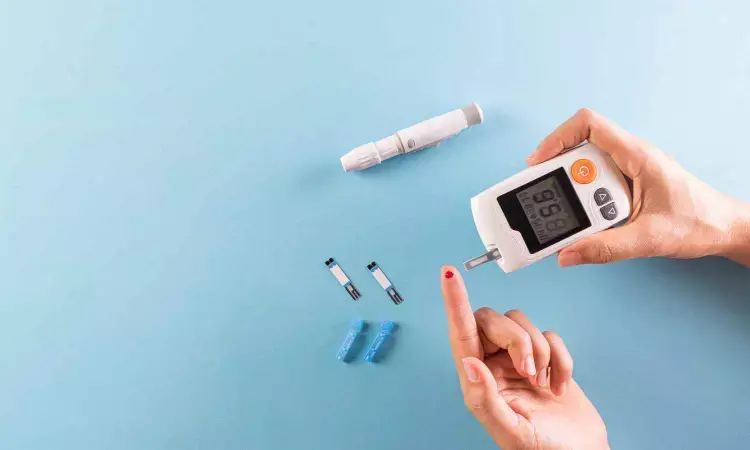- Home
- Medical news & Guidelines
- Anesthesiology
- Cardiology and CTVS
- Critical Care
- Dentistry
- Dermatology
- Diabetes and Endocrinology
- ENT
- Gastroenterology
- Medicine
- Nephrology
- Neurology
- Obstretics-Gynaecology
- Oncology
- Ophthalmology
- Orthopaedics
- Pediatrics-Neonatology
- Psychiatry
- Pulmonology
- Radiology
- Surgery
- Urology
- Laboratory Medicine
- Diet
- Nursing
- Paramedical
- Physiotherapy
- Health news
- Fact Check
- Bone Health Fact Check
- Brain Health Fact Check
- Cancer Related Fact Check
- Child Care Fact Check
- Dental and oral health fact check
- Diabetes and metabolic health fact check
- Diet and Nutrition Fact Check
- Eye and ENT Care Fact Check
- Fitness fact check
- Gut health fact check
- Heart health fact check
- Kidney health fact check
- Medical education fact check
- Men's health fact check
- Respiratory fact check
- Skin and hair care fact check
- Vaccine and Immunization fact check
- Women's health fact check
- AYUSH
- State News
- Andaman and Nicobar Islands
- Andhra Pradesh
- Arunachal Pradesh
- Assam
- Bihar
- Chandigarh
- Chattisgarh
- Dadra and Nagar Haveli
- Daman and Diu
- Delhi
- Goa
- Gujarat
- Haryana
- Himachal Pradesh
- Jammu & Kashmir
- Jharkhand
- Karnataka
- Kerala
- Ladakh
- Lakshadweep
- Madhya Pradesh
- Maharashtra
- Manipur
- Meghalaya
- Mizoram
- Nagaland
- Odisha
- Puducherry
- Punjab
- Rajasthan
- Sikkim
- Tamil Nadu
- Telangana
- Tripura
- Uttar Pradesh
- Uttrakhand
- West Bengal
- Medical Education
- Industry
Blue Index: A Comprehensive Tool for Enhancing Patient-Centered Diabetes Care, Study Reveals

India: A new tool known as the Blue Index (BI) is gaining attention for its potential to enhance diabetes management by providing a comprehensive, patient-centered care assessment.
A recent study published in the Journal of the Association of Physicians of India showed that the index includes a range of parameters that address various facets of diabetes care, including complications. The researchers suggest that it can be utilized by not only endocrinologists but also all physicians as a resource for monitoring and enhancing diabetic care.
Diabetes is a complex condition that requires meticulous management to prevent complications such as cardiovascular disease, neuropathy, and kidney failure. Traditional assessment methods often focus on isolated metrics, which can overlook the multifaceted nature of the disease. Assessing diabetes health encompasses a range of factors, including metabolic and nonmetabolic measures, as well as self-care practices such as diet, exercise, and follow-up habits. In contrast, the complications index focuses on macro and microvascular issues related to diabetes and foot complications.
The Blue Index (BI) is a comprehensive tool that integrates these health-related parameters and the systemic complications arising from diabetes into a unified assessment. In the study, Rupak Chatterjee, Senior Resident, Department of Medicine, College of Medicine and Sagore Dutta Hospital, Kolkata, West Bengal, India, and colleagues sought to assess the diabetes control status of patients using a single index.
For this purpose, the researchers conducted a prospective, observational study involving 100 adult diabetic patients, assessing their diabetic health status (DHS) and Komplications Score (KS) related to cardiovascular/macrovascular, microvascular, and foot complications. The Blue Index (BI) was calculated as a composite ratio, with measurements taken at baseline, after three months, and again at six months. The collected data was then statistically analyzed.
The following were the key findings of the study:
- Diabetic health status showed a significant increase in both the third and sixth months compared to baseline.
- The Komplications Score decreased significantly at these time points relative to baseline measures.
- The composite BI scores exhibited a steady rise, with increases of 9.62 at three months and 13.14 at six months compared to baseline.
- When analyzing based on the duration of diabetes diagnosis, DHS, KS, and BI scores demonstrated consistent changes.
- In terms of gender differences, DHS was notably higher in females at baseline compared to males, with both groups showing gradual improvements over time.
- Males had significantly lower KS scores than females, with a gradual decrease over the study period, indicating an improvement in complications.
- DHS was significantly correlated with both the duration of diabetes detection and age.
The findings suggest that the Blue Index (BI) is a straightforward tool that integrates multiple parameters addressing various facets of diabetes care, including complications. It can be utilized not only by endocrinologists but by all physicians to monitor and enhance diabetic management.
However, the authors noted some limitations, including a small sample size and its single-center design. Additionally, there were challenges in establishing clear distinctions based on the grading of retinopathy in the complications score, resulting in some overlaps.
Reference:
Chatterjee R, Naskar A, Samajdar SS, et al. Blue Index as a Comprehensive, Patient-centered Assessment of Care in Diabetic Patients. J Assoc Physicians India 2024;72(10):e1–e5.
Dr Kamal Kant Kohli-MBBS, DTCD- a chest specialist with more than 30 years of practice and a flair for writing clinical articles, Dr Kamal Kant Kohli joined Medical Dialogues as a Chief Editor of Medical News. Besides writing articles, as an editor, he proofreads and verifies all the medical content published on Medical Dialogues including those coming from journals, studies,medical conferences,guidelines etc. Email: drkohli@medicaldialogues.in. Contact no. 011-43720751


